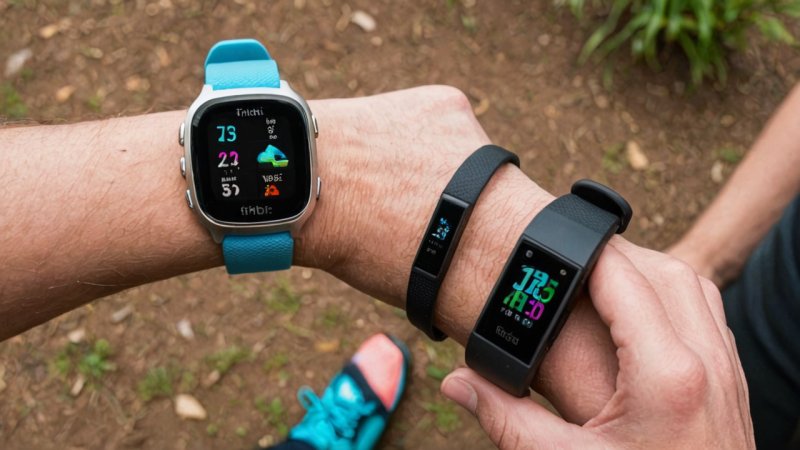In the realm of fitness technology, wearables have become indispensable tools for tracking health metrics and enhancing workout performance. Among the most popular brands, Fitbit and Garmin stand out for their innovative features, user-friendly designs, and extensive functionalities. This article will compare these two titans of fitness wearables, focusing on their respective strengths and weaknesses, to help you determine which one suits your fitness journey best.
Overview of Fitbit and Garmin
Fitbit, established in 2007, has long been synonymous with fitness tracking. Their devices are renowned for their simplicity and effectiveness, appealing to novices and fitness enthusiasts alike. Garmin, on the other hand, has a broader focus that includes navigation and outdoor activities. Their wearables are favored by athletes and outdoor adventurers, offering advanced metrics and rugged designs.
Design and Comfort
Fitbit
Fitbit devices are generally sleek and stylish, designed to be worn throughout the day without discomfort. The brand offers a variety of watch styles, from the minimalist Fitbit Inspire to the more robust Fitbit Sense. Most models come with interchangeable bands, allowing users to customize their look.
Garmin
Garmin wearables are often bulkier, reflecting their multifunctional capabilities. While some models like the Garmin Venu 2 have a more elegant design, many are geared towards serious training, with rugged materials that can withstand harsh conditions. The Forerunner series, for example, is designed for runners but may feel less comfortable for all-day wear compared to Fitbit devices.
Fitness Tracking Features
Fitbit
Fitbit excels in tracking basic health metrics such as steps, heart rate, sleep patterns, and calories burned. The Fitbit app provides an intuitive interface that allows for easy monitoring of daily activities and progress toward fitness goals. Advanced features like Active Zone Minutes and guided breathing exercises are also included, making it suitable for users who enjoy holistic wellness.
Garmin
Garmin takes fitness tracking a step further, offering a plethora of specialized metrics tailored for athletes. Features like VO2 max estimation, training load insights, and advanced running dynamics appeal to serious competitors. Garmin devices also offer sport-specific modes, including cycling, swimming, and triathlon tracking, making them ideal for multi-sport athletes.
Battery Life
Fitbit
Fitbit devices generally offer good battery life, with most models lasting between 5 to 10 days, depending on usage. However, this can vary with features like GPS usage, which can drain the battery more quickly.
Garmin
Garmin wearables are known for their outstanding battery life, with some models lasting several weeks on a single charge, particularly when GPS is not in use. This makes them particularly advantageous for long-distance athletes and outdoor adventurers who may not have frequent access to charging facilities.
App Experience and Ecosystem
Fitbit
The Fitbit app is user-friendly and visually appealing, making it easy to track progress and set fitness goals. It includes community features where users can connect with friends, join challenges, and share achievements. Fitbit’s integration with other health apps, including MyFitnessPal, enhances its utility.
Garmin
Garmin Connect offers a more complex experience, appealing to users who appreciate detailed analytics. However, it can be overwhelming for beginners due to its extensive features. Garmin’s ecosystem includes compatibility with various fitness apps and devices, allowing users to sync data across multiple platforms.
Price and Value
Fitbit
Fitbit devices are generally more affordable, catering to a broader audience. Prices range from budget-friendly options to mid-range devices, making it accessible for anyone looking to start their fitness journey without breaking the bank.
Garmin
Garmin wearables tend to be more expensive, reflecting their advanced features and durability. While they may be a significant investment, serious athletes and outdoor enthusiasts may find the added functionalities worth the cost.
Final Thoughts
Choosing between Fitbit and Garmin ultimately hinges on your personal fitness goals and lifestyle. If you're looking for a stylish, easy-to-use device for basic fitness tracking and wellness, Fitbit is a fantastic choice. However, if you're an athlete or outdoor enthusiast seeking advanced metrics and robust design, Garmin may be the better option.
In conclusion, both brands have their merits, and understanding your specific needs will guide you in making the right decision. Whether you opt for the simplicity of Fitbit or the complexity of Garmin, both wearables can significantly enhance your fitness journey.






